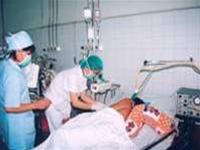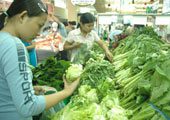After consuming contaminated food or drinks, individuals may suddenly experience symptoms such as nausea and vomiting (sometimes with blood), abdominal pain, and frequent diarrhea (watery stools, possibly mixed with blood). They may not have a fever or may have a high fever above 38°C.
Causes of Food Poisoning
 |
| Caring for food poisoning patients at the Poison Control Department – Bach Mai Hospital |
There are three main causes of food poisoning: chemical preservatives (pesticides, insecticides…), chemicals used in food processing (such as food coloring in various cakes, sticky rice, alcohol…), and microorganisms.
In emergency departments, poisoning cases can also arise from food and water contaminated with toxins such as metals (arsenic, zinc, lead…), organic substances, insecticides, and harmful substances (fruits and vegetables contaminated with pesticides, preservatives to prevent decay).
Additionally, there are super bacteria, their toxins, poisonous mushrooms found in food, and naturally occurring toxins in vegetables, fruits, and meats such as poisonous mushrooms, poisonous plants, toxic fish, belladonna, toad liver, toad eggs, cassava peels, carp bile, snake venom, and bee venom.
How to Recognize Food Poisoning
After consuming contaminated food or drinks (within a few minutes, hours, or even a day later), individuals may suddenly show symptoms: nausea and immediate vomiting (sometimes with blood), abdominal pain, and frequent diarrhea (watery stools, possibly mixed with blood). They may not have a fever or may have a high fever above 38°C.
In older adults and children under 5 years old, these symptoms are often more severe. If vomiting and diarrhea occur frequently, the patient is at risk of dehydration and electrolyte loss, which can lead to cardiovascular collapse and shock. Therefore, it is essential to pay attention to signs of dehydration, especially in those who vomit more than 5 times and have diarrhea more than 5 times, high fever, dry mouth, dry lips, sunken eyes, thirst (note: elderly individuals may not express thirst due to reduced sensations), rapid pulse, rapid deep breathing, fatigue, seizures, little dark urine.
What to Do?
If someone shows signs of poisoning and is still conscious, it is necessary to expel the poison from the food as quickly as possible by using two fingers to induce vomiting or by using a small spoon or stick to touch the back of the tongue (carefully to avoid injuring the mouth) to cause vomiting. When the patient vomits, keep their head lower than their chest to prevent aspiration into the lungs.
If the poison is known to be kerosene, gasoline, pesticides, or rodent poison, do not induce vomiting as it may cause the patient to inhale the poison into their lungs or have a seizure while vomiting. Instead, quickly administer activated charcoal (20-30g for adults, 5-10g for children).
Activated charcoal binds to toxins to prevent them from entering the bloodstream. Following this, administer magnesium sulfate or sorbitol to help expel toxins and charcoal through the stool. Ensure the patient drinks plenty of water to facilitate the excretion of the charcoal. At this point, the patient may be severely dehydrated, so it is crucial to rehydrate and replenish electrolytes by providing oral rehydration solutions or fluids like rice porridge, orange juice, or coconut water, especially after each episode of vomiting or diarrhea.
Continue to provide the patient with soft, easily digestible foods. If it’s a young child, allow them to continue breastfeeding as normal. If the patient shows severe dehydration, lethargy, high fever, or bloody stools, they must be taken to the hospital for timely intravenous fluids and treatment.
Preventing Food Poisoning
 |
| Food must be carefully selected, fresh, and not bruised (Photo: nld) |
To prevent food poisoning, everyone needs to be conscious of maintaining hygiene in eating, food preparation, and food business practices. Here are 8 essential guidelines to follow:
– Learn to identify edible and toxic plants, mushrooms, and fish. Absolutely do not consume unfamiliar foods.
– Carefully select food ingredients; they must be fresh and not bruised. Avoid eating spoiled fish and refrain from picking mushrooms from the roadside or in the forest.
– Prepare food thoroughly: cook completely, boil, and discard potentially toxic parts (remove cassava peels and soak before boiling; discard skin, heads, guts, and bile from fish before cooking…).
– Keep dishes, plates, and pots clean. Consume cooked food immediately. Any leftovers should be reheated before storing in the refrigerator. When reheating, ensure to boil again before eating.
– Control flies, cockroaches, and rodents… Ensure they do not come into contact with food.
– Wash fresh fruits and vegetables thoroughly, soak, and peel them before consumption.
– Do not consume fish bile for medicinal purposes. Never eat pufferfish. Avoid consuming illegally brewed alcohol.
– Wash hands with soap before eating or preparing food.


















































